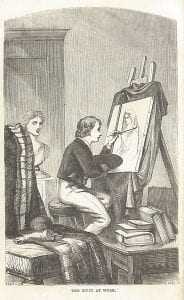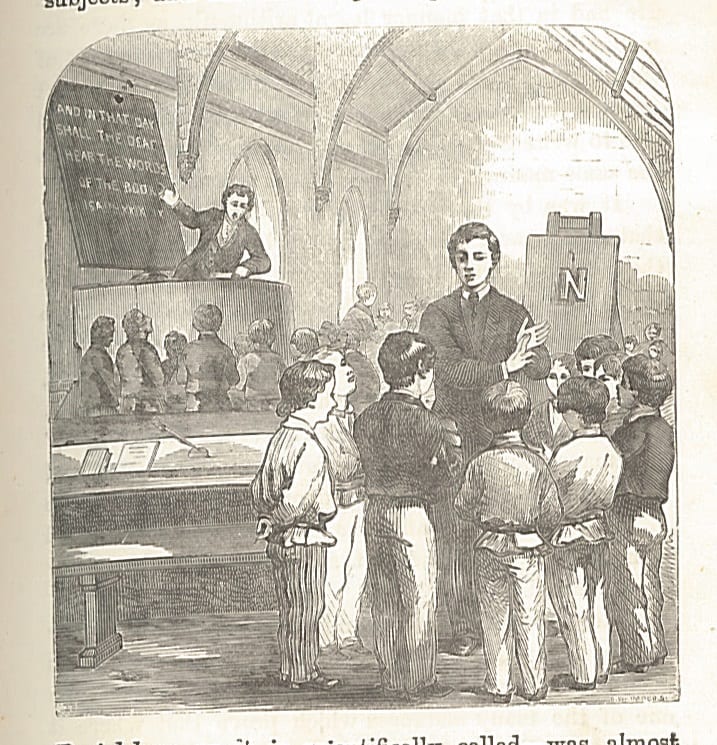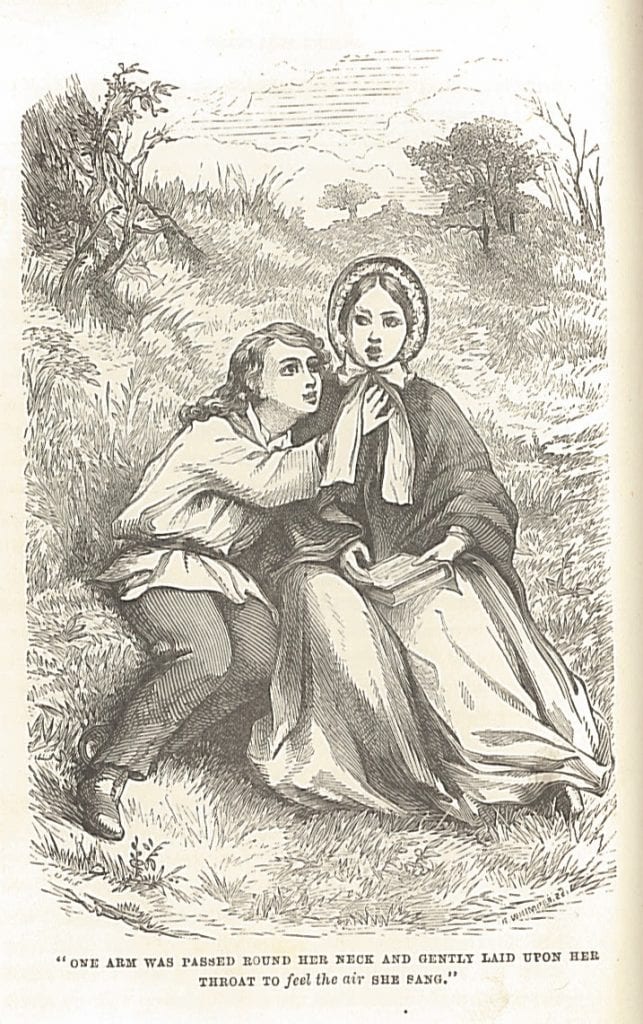“Why do you sing so loud, aunty,” – Annie Webb-Peploe’s story, Deaf and Dumb
By H Dominic W Stiles, on 14 October 2016
 “Why do you sing so loud, aunty,” said Jessie; “I like to hear you sing softly.”
“Why do you sing so loud, aunty,” said Jessie; “I like to hear you sing softly.”
“I want baby to listen to me,” replied her aunt hastily, and she continued her song even louder than before.
“Stupid little Arthur,” said Jessie.
“Poor little Arthur,” said Aunt Amy, with a heavy sigh.
(Deaf and Dumb)
Annie Molyneux, a prolific, if more or less forgotten Victorian author, was born on the 24th of February 1806 (not 1805 as so many bibliographical details say), daughter to John Molyneux (one of a remarkable fifteen children), and a descendant of Thomas Molyneux, who was born in Calais when it was still English. Thomas settled in Ireland and the family entered politics, with some of his descendants and Annie’s ancestors becoming Irish MPs. Annie married John Birch Webb, who became the vicar of Weobley in Herefordshire. In 1866 he took the surname Peploe, so they became the Webb-Peploe’s. Annie Webb-Peploe, or Webb in the earlier part of her life, is as I say, hardly known now, but if she is read or remembered, it is probably for the book Naomi: or, The last days of Jerusalem (1841), which is a particular genre of ‘conversion’ literature that Annie wrote a number of books on. The main character is a Jewish woman who becomes a Christian. It went through a considerable number of editions, including in the U.S.A., and was also translated to Danish in 1892, and German in 1900. I did not spot any English edition quite that late, but Valman says that it continued to be published to the end of the century. It might be interesting to draw parallels between her attitude to “the devoted and impenitent Jews” (Naomi, preface, p. v) and the Deaf people in her short story, Deaf and Dumb (uncertain date). There is an interesting chapter in Valman’s 2009 book (see reference below), that discusses Naomi. 
Deaf and Dumb* tells the story of a deaf boy called Arthur, and his sister Jessie who are orphaned as young children. They live with their aunt who then sends the boy to be educated at the Exeter School. The boy is at first educated ‘by signs’, then “when he became an intimate of the asylum it was considered time to cultivate his power of speech, which, strange as it may seem to some of our readers, is actually as perfect with those who are called deaf and dumb as with those who have spoken from infancy” (Chapter 2, page 3 – though the pages of the whole book are unnumbered). She seems to have taken some trouble with the details of education at Exeter, but I am unclear as to what she means about ‘the art of speaking on the fingers – or dactylology’ (Chapter 2 p.6) – is she referring to sign language or fingerspelling? The stress seems to be on becoming oral, learning to speak –
The author has heard a deaf and dumb lady read a newspaper quite intelligibly, and also converse with a mutual friend who was also deaf and dumb, and with whom she had been brought up at Braidwood’s establishment. The tone of their voices was guttural and rather monotonous, but by no means difficult to understand.
Yes it is ‘preachy’ and in my view not terribly well written, but it is interesting. I suspect the book dates from circa 1860-65 based on her name as it appears – Mrs Webb, and on the few details on her two fellow writers in the collection. Our copy must I think be very rare indeed.
It is difficult to find out anything much about Annie Webb-Peploe, even though she wrote and published quite a lot over a long period. She does not as yet appear in the ‘Orlando – Women’s Writing’ pages, unlike two of her three fellow writers who are published in the same volume, Frances Browne and Frances Mary Peard (the third being L.A. Hall). Her three sons went into the army (Daniel), the navy (Augustus), and the church (Hanmer). Hanmer was a member of the evangelical ‘Holiness Movement‘, and has an entry in the DNB (see below). You can see more of her family details here. She died in 1880. It seems that she is ripe for some research by someone interested in Victorian literature. I am sure there are Webb-Peploes around today who might have some family records that would add to the bare details, and a photograph perhaps.
I have saved the whole story as a pdf for those interested. When opened, right click the file to put it the right way up. Deaf and Dumb by Mrs Webb
 http://id.loc.gov/authorities/names/n84051745.html
http://id.loc.gov/authorities/names/n84051745.html
The Jewess in Nineteenth-Century British Literary Culture de Waard, Marco. Gender Forum 21![]() (2008) (Review)
(2008) (Review)
Valman, Nadia, The Jewess in Nineteenth-Century British Literary Culture, CUP 2009
Online Books by Mrs. Webb-Peploe
I. T. Foster, ‘Peploe, Hanmer William Webb- (1837–1923)’, Oxford Dictionary of National Biography, Oxford University Press, 2004 [http://www.oxforddnb.com/view/article/47130, accessed 3 Oct 2016] – see also here.
2 Responses to ““Why do you sing so loud, aunty,” – Annie Webb-Peploe’s story, Deaf and Dumb”
- 1
-
2
Gerard Molyneux wrote on 26 August 2019:
Annie was the daughter of my gt.gt.gt. grandfather’s younger brother Captain John Molyneux R.N. of Gravel Hill, Ludlow.
Today Rupert Peploe has more information about her and her family.
 Close
Close


[…] There is a good chance that Scott was the head when the fictional Arthur in the short story by Mrs Webb was published – in other words, perhaps he and Mr Wheatley were the models for the teachers […]